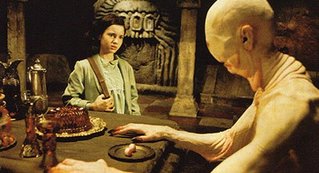 Pan's Labyrinth
Pan's Labyrinthdir. Guillermo del Toro
2006
"The prophecy was a lie, Morpheus. It was all another system of control."
- Neo (Matrix Reloaded)
"The (pills) that mother gives you don't do anything at all."
- "White Rabbit"
"We will be greeted as liberators."
- anonymous
Early in my career in game development, I was working at a badly mismanaged start up. As the business failed, some of us who had seen the handwriting on the wall split off to start our own company. We'd watched for months as mistake after mistake, lie after lie, brought our little start up down and we knew, knew, that we could do a better job on our own.
Of course, within months, we too failed (though benigningly, not having burned through millions of dollars.) So long as we had a common enemy, we could stand united opposed to the stupidity around us. Once it was our own stupidy in question, well, it turned out we didn't agree on as much as we thought we did.
In Pan's Labyrinth, Ivana Basquero plays Ofelia, daughter of a widow who recently married a cruel and sadistic captain in Franco's army. At the beginning of the film, Ofelia and her mother (pregnant with the captain's child) arrive at the captain's station in the woods where he is viciously prosecuting a campaign the against anti-fascist resistance.
To escape the sadness and brutality around her, Ofelia creates a Lewis Carroll/CS Lewis-like fantasy world, wherein she is a long lost princess who must complete various dangerous tasks to reclaim her throne.
As visually stunning and emotionally gripping as the story is, the real surprise is the nuanced view the film gives us of the role of fantasy and myth in our lives. Myths, fairy tales and folk stories can help us understand the world, but they can also help us misunderstand the world.
As the campaign against the resistance comes to a head and the strains within the captain's household increase, Ofelia's fantasies take her further and further away from understanding the reality around her. The comic boogeymen and magical thinking that children use to cope with fear and powerlessness become increasingly difficult to relate to. Alienated from both the real and fantasy worlds she inhabits, Ofelia truly becomes a lost child.
A strong comparison can be made to Peter Jackson's Heavenly Creatures, in which the fantasy world of two Australian school girls spills into reality with murderous result. In that film, however, there is little ambiguity about the role of fantasy. The pas de deux of the two central characters cannot be seen as anything but insanity.
In Pan's Labyrinth, things are not so simple. Indeed, we can see that what understanding Ofelia does have of the world has been well-served to this point by her imagination. In the beginning, she seems more articulate, more perceptive and more in touch with the world around her than the adults. For all their dismissiveness of her "children's stories," it is they who are living in a fantasy.
And had this been The Chronicles of Narnia, it would have stayed a pre-adolscent fantasy. But del Toro doesn't let us off that easily. As the events of the real world reach their violent conclusion, it is adults who drive the story, adults who set the agenda, and Ofelia who finds herself increasingly trapped by the fantasy she has created.
And that's the warning the film has for us in our time. The world is complex, messy, irrational, weird, contradictory and difficult to pin down. We use narrative and myth as a kind of Fourier-transform, dissecting the messy signal of reality into neat, discrete components. This helps us make sense of the world around us by allowing us to glimpse it in parts and integrate the whole in our minds.
But, when you become more invested in the story than in the reality it reflects, when the outcome of your fantasies means more to you than the reality on the ground, the scanner which showed you the world so clearly now renders that same reality quite darkly.
Four stars. Little Red Jason Hood sez, don't let the bed bugs bite.

2 Comments:
Hmmmm. I didn't get so much of the cautionary tale out of it as you did, though your review is immaculately written. I took from it that she was, through her fantasy learning the lesson that many of the adults (with the exception of the doctor) failed to learn: that there is a time to obey authority and a time to stand in defense of your beleifs, and to shatter whatever hold your own fantasies of authority may have over you.
Yes, Ofelia learns a great deal from her experiences in the Labyrinth, especially about questioning authority as you note.
The cautionary element stands out for me because it sets the sharpest contrast between events in the Labyrinth and events in the real world.
Where fantasy and reality are in parallel, that is the opportunity to learn and to grow. Where they are in contradiction, they have the potential of misleading.
For example, the faun gives Ofelia very little useful advice for dealing with the captain or allying herself to Mercedes (the housekeeper.) Had she done better in these areas, Ofelia's story might have been happier.
Post a Comment
<< Home